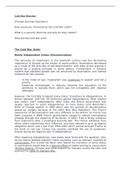Cold War Revision
(Prompt Seminar Questions)
How would you characterise the Cold War order?
What is a security dilemma and why do they matter?
Why did the Cold War end?
The Cold War Order
Newly Independent States (Decolonisation)
The decrease of imperialism in the twentieth century saw the decreasing
importance of Europe as the arbiter of world politics. Imperialism decreased
as a result of the principle of self-determination, with state actors arguing it
should be a guiding principle in world politics. Furthermore, it became
evident that capitalist growth was not enhanced by imperialism, and instead
hindered for two reasons:
- In the midst of war, imperialism was expensive to support and not a
priority
- Enhanced technologies in industry required the education of the
workforce to operate them, which was not compatible with imperial
ideologies
However, the Cold War hindered many states’ transitions to independence. In
Britain between 1947-80, 49 territories gained independence. Most notably
was India’s 1947 independence. After India, the British government was
largely reluctant to grant independence to more states until Macmillan’s
Wind of Change speech in 1960 which saw the process of decolonisation
speed up (largely because of the 1953 Mau Mau Rebellion). The French
experience of decolonisation was very different to the British; as France had
been occupied in WWII French governments sought to restore international
prestige through the regaining of territories. In 1945, France finally withdrew
from Indo-China after a prolonged Guerrilla War. The French withdrew from
Africa whilst maintaining their influence, and they refused to give up Algeria
altogether which saw a war from 1954-1962 which almost brought France to
the brink of civil war. France has recently admitted the use of systematic
torture during the Algerian War of Independence.
After regaining independence, new states were faced with the question: How
do we restore political stability? Some countries, such as Vietnam, resorted to
communism. This scared the West, who feared the transition of some states
to communism would lead to a domino effect of states turning to communism
(domino theory). Chinese and USSR support for Vietnam scared the USA, and
sparked the 1955-75 Vietnam War.
, Relationship Between the Two Hegemons: USA and USSR
After 1945, the USA rose to become a major world hegemon. Its relationship
with the communist USSR dominated world affairs until 1989. Additionally,
the relationship between the USSR and Eastern Bloc, as well as the PRC
(People’s Republic of China) was crucial.
Key Events in the Cold War:
- Failure to implement principles agreed during the wartime conferences
(Yalta, Potsdam and Geneva)
- Growing tensions in Germany and Poland
- Awareness that USSR’s European policy was one of communist
ideological expansion
- American policies of containment, the Marshall Plan for European
Economic Recovery 1947
- Conflict in Berlin 1948 which provoked the Berlin Blockade and the
Berlin Wall
- Establishment of NATO in 1949 which blocked the USSR from the
Treaty (members include: Belgium, Canada, Denmark, France, Iceland,
Italy, Luxembourg, Holland, Norway, Portugal, UK and USA)
- Establishment of the Warsaw Pact 1955 (USSR, Albania, Bulgaria,
Czechoslovakia, E. Germany, Hungary, Poland, Romania).
- Korean War 1950: arose as part of a communist strategy and saw the
USA become embroiled in its affairs. Lasted three years and took three
million lives. Saw more and more American troops based in Europe.
- Establishment of Israel 1948 reflected the legacy of NSDAP genocide.
Moscow and Washington supported the creation of Jewish Israel and
Arab Land (Despite the fact that after 195o the USSR supported Arab
nationalism due to the Egyptian socialist leader, General Nasser.
- Khrushchev’s ascension as USSR leader sparked an era of
modernisation and expansion across the Eastern bloc. The USSR
withdrew from some conflicts, as in Poland, but became embroiled in
others.
- 1962 Cuban Missile Crisis saw tensions thaw as more and more states
began to develop nuclear technology: Britain 1952, France 1960, China
1964, India 1974, Pakistan 1998.
- Nuclear Non-Proliferation Treaty (NPT) 1968: states with nuclear
weapons committed themselves to halting the arms race, and those
without promised not to develop them. The USSR recognised the
Treaty.
- 1973 Arab-Israeli War embroiled Washington and Moscow in a
dangerous situation. Egyptian alliance switched from Moscow, to
Washington.
- USSR support for revolutionary movements in the Third World, such as
Afghanistan in 1978.
- December 1979, NATO threatened to deploy missiles if Moscow did not
reduce their military capacity. Jimmy Carter withdrew from the SALT II
Treaty, boycotted the 1980 Moscow Olympics and announced the




